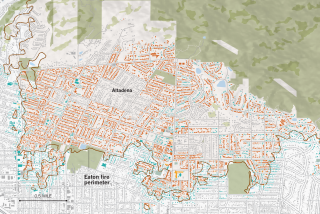No one knows what’s behind L.A. County’s rise in mental competency cases

Dist. Atty. Jackie Lacey said of the increase in competency cases, “I think it’s a sign that we urgently need to embrace the mental health diversion program.”
- Share via
The morning calendar in Department 95 was busy, as usual.
Housed in a nondescript brick building on an industrial stretch of San Fernando Road in Cypress Park, the courtroom handles mental health cases for Los Angeles County Superior Court.
On a recent Thursday, the roughly 70 defendants set to appear included a homeless man charged with violations related to camping in a Beverly Hills park; a woman accused of embezzling money from an elderly acquaintance; and a woman charged with felony battery on a police officer. She was accused of kicking an officer who had tried to remove her from the Pasadena library.
These defendants, like most on the docket, had been sent to Department 95 to determine whether they were too mentally ill to stand trial.
See more of our top stories on Facebook >>
Many had been driven from jail to the court by sheriff’s deputies that morning, but the homeless man in the Beverly Hills case had made his way across town on the bus, toting trash bags full of his belongings. In the hallway, the public defender assigned to the case introduced himself and asked the man if he had a history of mental health issues.
The client said no. His problem, he said, was that the CIA was tracking him. At his hearing, the court found him incompetent to stand trial and ordered him to go into treatment through an outpatient program.
More and more cases like these are landing in Department 95, and it’s not clear why.
Competency cases increased by nearly 50% from 2014 to last year. Between 2010 and 2015, the annual total ballooned from 944 to 3,528.
L.A. County Superior Court does not compile detailed data on what types of criminal cases wind up in mental health court. Attorneys, judges, doctors and law enforcement officials say they can only guess why the caseload is growing.
Dist. Atty. Jackie Lacey, who led a task force focused on diverting mentally ill people from county jails, could not say what is driving the increase.
But she said, “I think it’s a sign that we urgently need to embrace the mental health diversion program.”
Defense attorneys who believe their clients are too mentally ill to understand the proceedings against them or to help in their own defense can request a competency hearing. Once that happens, all misdemeanor and most felony cases are referred to Department 95.
Doctors are assigned to evaluate the defendant and give an opinion on their fitness to stand trial.
A defendant found incompetent must undergo treatment to restore competency before criminal proceedings can proceed. For felony defendants, that usually means going to a state hospital. Misdemeanor defendants are treated in jail or through a new county program that places them in hospitals, residential facilities or outpatient programs.
Kristen Ochoa, a psychiatrist who evaluates defendants for competency and runs the county’s new treatment program for misdemeanor defendants, said she doesn’t know why the caseload is soaring. But she said it doesn’t appear to stem from an increase in people faking mental illness to get out of criminal charges.
“What I’ve been seeing is people who really have serious mental disorders,” she said. “If anything, I feel that the cases have been people who are more impaired than usual.”
Some officials attribute the increase to criminal justice reform measures that have reduced the state’s prison population, to the growing number of homeless residents in the county, or to shortfalls in the mental health system.
Verah Bradford, head deputy public defender at the mental health court, said a “convergence of issues” was probably at play, including increasing awareness about mental illness among attorneys and judges and the rise in homelessness.
“Is it because more people are mentally ill or is it because more people are jammed into homelessness and commit behaviors that offend the public?” she said.
A Times review of 98 recent competency cases involving 72 defendants showed a variety of charges, including petty theft, attempted murder and sexual abuse of a child. The most common charges were related to trespassing, drug crimes, simple battery and vandalism.
Mark Gale, criminal justice chairman for the L.A. County Council of the National Alliance on Mental Illness, said he thinks the shortage of long-term care facilities for the severely mentally ill is at the heart of the increase.
“I bet if you were to look at the histories of these people, they’re revolving through the hospitals” in short-term emergency stays, Gale said. “They’re getting warehoused, shot up with meds and then released without a discharge plan.”
Others say the increase is a sign that attorneys and judges are becoming more aware of mental illness.
“I think we’re all realizing that all of us would be better off if the mentally ill receive treatment,” said Jonathan Petrak, a public defender at the mental health courthouse. “They’ll be safer, society will be safer, and it will make for a healthier community.”
Whatever the reason, the increase is testing the court’s resources and causing some defendants to spend more time in jail.
On any given morning, several defendants are likely to miss their court dates in Department 95 because of a lack of space in the courthouse holding cells. Many return to jail until the next available court date.
“I have seen defendants miss court for three or four settings,” said Robert DeCarteret, a prosecutor in the mental health court. “This means a month can go by and no one has evaluated them.”
Judge James Bianco of the mental health court said the threefold increase in cases over the last five years means “every part of the system is strained.”
“We need three times as many attorneys, three times as many doctors for evaluations, and three times as many treatment beds,” he said. “Of course we have none of this, so everyone is scrambling to try to keep up.”
The increase in cases also signals continued crowding in jail psychiatric units. More than 4,000 people needing mental health treatment are in L.A. County jails, according to sheriff’s officials, including 1,000 in the high-observation unit for the most severely ill.
As of late January, more than 300 of those were people who had been found incompetent to stand trial, including 166 felony inmates waiting to go to state hospitals and 161 misdemeanor inmates undergoing treatment in the jail.
Since September, 70 misdemeanor defendants found incompetent to stand trial have been released into the new community treatment program, and officials hope to expand it.
But felony defendants are not eligible. A small number of them are sent to a controversial competency restoration program run by a private contractor in a San Bernardino County jail. Public defenders argue that jail is not an appropriate setting for mental health treatment, while proponents point out that many of the defendants would be stuck in jail in any case because there aren’t enough state hospital slots.
And the misdemeanor program has had its own issues. Ochoa said about 15% of the participants have walked away from treatment facilities. Some came back voluntarily, others were picked up on warrants, and some remain outstanding.
“You always hope for 100%, but you have to be realistic,” she said. “This is a very difficult to treat population.… For us, what’s most important is that people who belong in the hospital should not be in jail.”
Twitter: @sewella
ALSO
Murder charges against rehab center are a first in California
Suspected street racer still at large after fiery crash that killed three
Anti-KKK protesters in Anaheim demand release of demonstrators from jail
More to Read
Sign up for Essential California
The most important California stories and recommendations in your inbox every morning.
You may occasionally receive promotional content from the Los Angeles Times.











